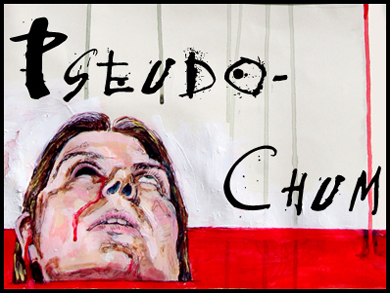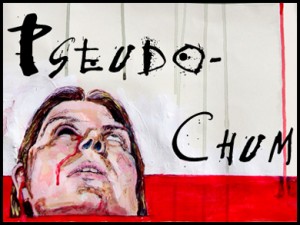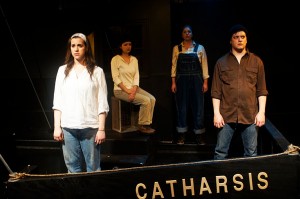
 Highly Recommended ****As an undergraduate, I considered writing an essay on The Categorical Imperative and the immorality of art. Sean and Carolyn Benjamin’s play “Psuedo-Chum” makes me awfully glad I didn’t. Despite their high technical skill, both as playwrights and directors, this play never really manages to meaningfully explore whether playwrights are businessman or activists, whether the two are mutually exclusive, and whether it is morally okay that artists use human suffering to make a profit, leaving us to wonder if these questions are even seriously being considered at all. Fortunately, the play doesn’t need to do consider them. It succeeds independently of such questions, particularly on the level of dialogue and satire from excellent writing, and on the level of production as meta-theatre from the superlative direction and acting.
Highly Recommended ****As an undergraduate, I considered writing an essay on The Categorical Imperative and the immorality of art. Sean and Carolyn Benjamin’s play “Psuedo-Chum” makes me awfully glad I didn’t. Despite their high technical skill, both as playwrights and directors, this play never really manages to meaningfully explore whether playwrights are businessman or activists, whether the two are mutually exclusive, and whether it is morally okay that artists use human suffering to make a profit, leaving us to wonder if these questions are even seriously being considered at all. Fortunately, the play doesn’t need to do consider them. It succeeds independently of such questions, particularly on the level of dialogue and satire from excellent writing, and on the level of production as meta-theatre from the superlative direction and acting.
The stately, tall, and classically glamorous Carolyn Benjamin gives what is perhaps the most highly credible performance in the play: counterintuitively, as a professional, but sensationalist, mainstream literary-journalist. Her character may be a caricature, but she shows us with comic genius that it is a very real one with whom we are all familiar. She aggressively interviews her subject, the famous author (Sean Benjamin) of a pretentious and burdensome play, ostensibly written as protest against shark-culling, that four other actors direct, rehearse, and act out in front of us. Sean Benjamin’s portrayal as the author is likewise highly comical and satirical, almost camp, but he crucially injects an urgency and pathos into the delivery of his lines which raises this play above the level of simple, funny, farce.
The actors playing the four characters directing and acting out the play within the play have a more difficult task. The author-character complains that his play is about actors who would not even be talented enough to play themselves. Thus, the four actors have to play mediocre actors in the play-within-the-play and play mediocre actors well. By and large, they succeeded at a pretty impossible task. Amy Berkovech, Beth Kandor, and Aaron Lawson give us a sense of actors living in constant fear under the tyrannical director and star of the author’s play (Allison Connelly) who likewise is very convincing as a director, more competent than the actors she is struggling to work with, but not nearly talented enough to justify her Orson Well’s complex.
Speaking of Orson Welles Complexes’, one might notice the considerable repetition of Carolyn and Sean Benjamin names as writers, actors, directors and technical designers in the program (or in this review). This is one of those rare circumstances where the writers’ constant presence in the production add to, rather then diminishes the play. Firstly, the Benjamins show considerable humility, not ego, in being able to laugh at themselves and , in doing so, they give us permission to laugh with them. Secondly, the conceit of the play that writing is really shark culling, and the artists are immoral because they make use of people’s pain come across as so sophmoric (perhaps it is supposed to?) that the play was only going to succeed at the level of satire and meta-theater, which it does spectacularly, largely because the writer of the play we are watching is playing the writer of the play we are watching, being rehearsed and performed. (Perhaps this is hyper-meta-theater?)Ultimmately, this is one of the funniest modern plays I have seen produced, with great acting and razor sharp dialogue, and though it could have used an intermission, I was laughing the whole time and often thinking, even if I wasn’t sure whether I was thinking about what the authors intended.
Psuedo-Chum is playing through November 16th at the Neo-Futurarium which is located at 5153 N. Ashland. Performances are Thursday through Saturdays at 7:30 pm. Regular Tickets are $20 and Student Tickets are $10 with a valid ID. Thursday performances are pay what you can. For Tickets or information, visit www.neofuturists.org or call 773-275-5255.
To see what others are saying, visit www.theatreinchicago.com, go to Review Round-up and click at “Psuedo-Chum”






More Stories
“Joseph and the Amazing Technicolor Dreamcoat”
“The Book Of Mormon” ( Milwaukee) reviewed by Amy Menzel
“The Joffrey Ballet’s Golden Hour” reviewed by Carol Moore